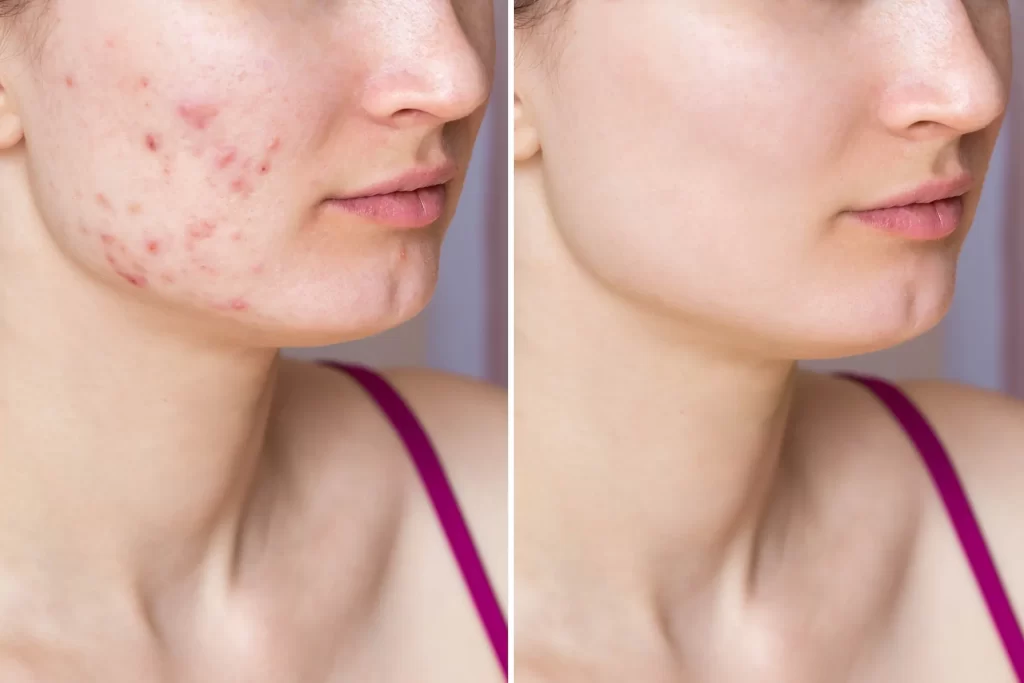Stress may be an important contributor to acne for some people. If you notice that your breakouts occur during times of high stress, try keeping a diary and noting when your acne flares up to see if there is a correlation.
Lower cortisol levels through healthy lifestyle habits can help prevent breakouts. This includes exercise, adequate sleep, eating a diet rich in fruits, vegetables, and whole grains and taking supplements that support skin health, like zinc, vitamin C, and omega-3s.
1. Stress Causes Inflammation
Stress causes inflammation in the body, which in turn can exacerbate acne by triggering oil production. It also slows the skin’s ability to heal, so pimples stay around longer and can worsen in severity.
Stress acne typically shows up on the jawline and chin because these are the oiliest parts of the face, Zeichner says. It tends to look like a combination of blackheads, whiteheads, red bumps, and pus-filled pimples. It’s usually a flare-up or worsening of preexisting acne caused by a specific emotional event or period, she adds.
To see if stress is influencing your breakouts, keep track of when you break out over the course of a few weeks and compare it to your mood (and when you feel stressed). Exercise, meditation, a healthy diet, and plenty of sleep are all great ways to reduce anxiety and keep your breakouts at bay.
2. Increased Oil Production
Studies show that stress can lead to overproduction of oil by the skin. This happens because of the cortisol hormone that binds to sebum-producing glands. This overproduction of oil can cause clogged pores and increase the chances for breakouts. Sebum production is also related to genetics, as people tend to have larger pores in the areas of their face that are most affected by acne (the forehead and nose).
Stress can be minimized by practicing relaxation techniques, establishing a consistent sleep routine, and not overstimulating the brain before bed by staring at a digital screen. A balanced diet that is low in sugar and dairy can help as well.
3. Acne Triggers
The exact causes of acne are not completely understood, but hormone changes during puberty and midlife, as well as certain medications, such as birth control pills, lithium, and corticosteroids, can lead to breakouts. A diet rich in sugar and carbohydrates, like soda, bread, white rice, chocolate, and chips, may also irritate the skin.
Stress doesn’t directly cause breakouts, but it can make them worse. High levels of stress hormones, like cortisol, can disturb the natural hormonal balance in our bodies. This causes androgens to increase, which can encourage more oil production and clog pores.
Stress can also exacerbate already-existing breakouts by disrupting healthy habits, such as sleeping and eating well. Practicing relaxation techniques, such as meditation, yoga, and deep breathing, can lower cortisol levels and improve skin health.
4. Excessive Eating
Stress and lack of sleep both increase the likelihood of breakouts. The body generates hormones when stressed that prompt the sebaceous glands to produce more oil, which can lead to clogged pores and acne breakouts.
Stress also leads to excessive eating, especially of high-glycemic foods such as sweets and processed foods. These foods may worsen inflammation and exacerbate oil production in the skin, contributing to more severe breakouts.
To avoid these effects, try to stick to a healthy diet that limits sugary and processed foods and drinks, and focuses on lean proteins and fruits and vegetables. It is also helpful to practice a mindful approach to eating and adopt a health at every size philosophy that recognizes that people’s individual hunger cues, daily caloric needs, and metabolisms vary.
5. Lack of Sleep
As anyone who has suffered through a sleepless night can attest, lack of rest can be a major trigger for acne. Sleep deprivation causes stress, and as a response to this the body releases cortisol, a fight-or-flight hormone that leads to overproduction of sebum and increased cellular inflammation. This weakens the skin barrier function, allowing harmful toxins and bacteria to penetrate the skin and cause acne breakouts.
Fortunately, there are a few easy ways to help combat stress-related acne. First, be sure to wash your face with a gentle cleanser that is noncomedogenic (meaning it won’t clog pores), such as the CeraVe Acne Foaming Cleanser or the Cetaphil Gentle Facial Wash. Second, exercise regularly—this can be as simple as a daily walk or low-intensity workout. And last, be sure to hydrate by drinking plenty of water—this helps reduce cortisol levels and decrease inflammation.







More Stories
Acne Management for Remote Workers: How Your Home Environment Is Your Skin’s New Boss
Acne-Safe Makeup and Skincare for Gender-Affirming Hormone Therapy
Adapting Acne Routines for Extreme Climates: Desert Dryness vs. Tropical Humidity